新版仁爱英语七年级下册总复习资料
最新仁爱版七年级英语下册期末知识点总复习
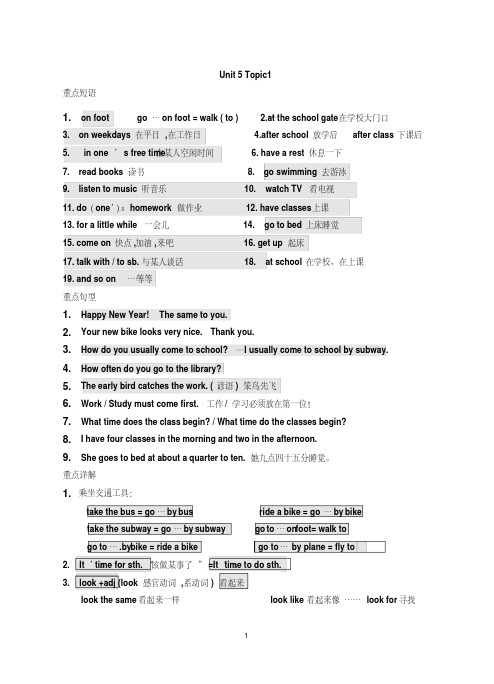
Unit 5 Topic1重点短语1.on foot go …on foot = walk ( to )… 2.at the school gate在学校大门口3. on weekdays 在平日 ,在工作日4.after school 放学后after class 下课后在某人空闲时间 6. have a rest 休息一下5. in one’s free time7. read books 读书8. go swimming 去游泳9. listen to music 听音乐10. watch TV 看电视11. do(one’s)homework 做作业12. have classes 上课13. for a little while 一会儿14. go to bed 上床睡觉15. come on 快点,加油,来吧16. get up 起床17. talk with / to sb.与某人谈话18. at school 在学校、在上课19. and so on ……等等重点句型1.Happy New Year! The same to you.2.Your new bike looks very nice. Thank you.3.How do you usually come to school? —I usually come to school by subway.4.How often do you go to the library?5.The early bird catches the work. (谚语) 笨鸟先飞6.Work / Study must come first. 工作/ 学习必须放在第一位!7.What time does the class begin? / What time do the classes begin?8.I have four classes in the morning and two in the afternoon.9.She goes to bed at about a quarter to ten. 她九点四十五分睡觉。
(完整版)仁爱版七年级英语下册知识点总结
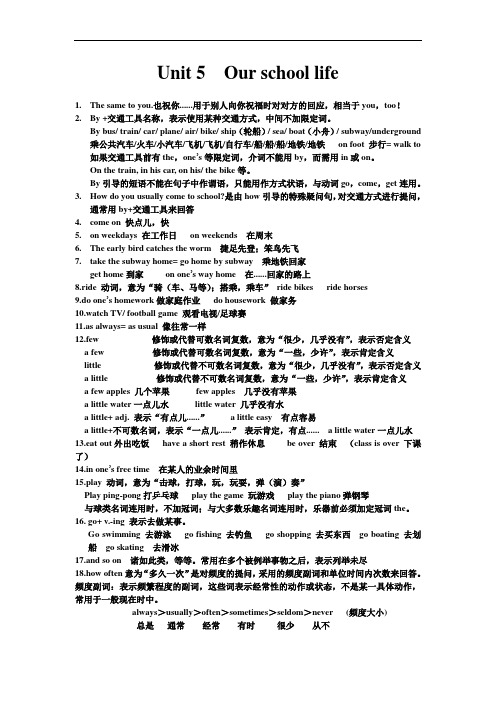
Unit 5 Our school life1.The same to you.也祝你......用于别人向你祝福时对对方的回应,相当于you,too!2.By +交通工具名称,表示使用某种交通方式,中间不加限定词。
By bus/ train/ car/ plane/ air/ bike/ ship(轮船)/ sea/ boat(小舟)/ subway/underground 乘公共汽车/火车/小汽车/飞机/飞机/自行车/船/船/船/地铁/地铁on foot 步行= walk to 如果交通工具前有the,one’s等限定词,介词不能用by,而需用in或on。
On the train, in his car, on his/ the bike等。
By引导的短语不能在句子中作谓语,只能用作方式状语,与动词go,come,get连用。
3.How do you usually come to school?是由how引导的特殊疑问句,对交通方式进行提问,通常用by+交通工具来回答e on 快点儿,快5.on weekdays 在工作日on weekends 在周末6.The early bird catches the worm 捷足先登;笨鸟先飞7.take the subway home= go home by subway 乘地铁回家get home到家on one’s way home 在......回家的路上8.ride 动词,意为“骑(车、马等);搭乘,乘车”ride bikes ride horses9.do one’s homework做家庭作业do housework 做家务10.watch TV/ football game 观看电视/足球赛11.as always= as usual 像往常一样12.few 修饰或代替可数名词复数,意为“很少,几乎没有”,表示否定含义a few 修饰或代替可数名词复数,意为“一些,少许”,表示肯定含义little 修饰或代替不可数名词复数,意为“很少,几乎没有”,表示否定含义a little 修饰或代替不可数名词复数,意为“一些,少许”,表示肯定含义a few apples 几个苹果few apples 几乎没有苹果a little water一点儿水little water 几乎没有水a little+ adj. 表示“有点儿......” a little easy 有点容易a little+不可数名词,表示“一点儿......”表示肯定,有点...... a little water一点儿水13.eat out外出吃饭have a short rest 稍作休息be over 结束(class is over 下课了)14.in one’s free time 在某人的业余时间里15.play 动词,意为“击球,打球,玩,玩耍,弹(演)奏”Play ping-pong打乒乓球play the game 玩游戏play the piano弹钢琴与球类名词连用时,不加冠词;与大多数乐趣名词连用时,乐器前必须加定冠词the。
仁爱英语七年级下册总复习资料

仁爱英语七年级下册总复习资料七年级英语(仁爱版)下册复习教案Unit 5 Our School Life任务形学习目标:1.掌握并能熟练运用表达交通方式的句型。
2.掌握频度副词的表达方式。
3.掌握一般现在是的用法。
重点词语:1.兼类词:early walk ride watch American rest play swim2.多意词:by乘车 by train\ subway靠近,在------的旁边by the fireplace在------时间 by the time被That card was made by Lucy.用by hand由People show their love to their mothers by giving cards and other presents.(1) 词组1. wake up2. take a subway3. ride a bike4. get to school5. have a shot break6. play basketball7. play computer games8. play the piano9. listen to music 10. go roller skating 11. write letters 1.at the school gate 2. at around six o’clock 3. on weekends = on the weekend 4.on weekdays 5.in one’s spare time 6. after lunch\breakfast\supper7.after school \class 8.a little while9.ONCE\TWICE\THREE TIME A WEEK------HOW OFTEN重点句型1. How do you usually come to school?(by bus \bike\ subway\ car\ train\ ship, on foot, on my bike, on a bus, in a car---)Do you often come to school by bike?2. How often do you go to library?(always\ usually\ often\ sometimes\ seldom\ never\ ---)3. What time do you get up on weekdays?4. You must go to school early.5. Your new bike looks very nice!6. They often play basketball or football, go swimming and so on.7. Work must come first8. She likes English best.9. The early bird catches the worm.10. It’s time for sb.to do sthIt’s time for + n.要点讲解1.如何正确乘坐交通工具(主要有两种表达方法:介词表达方法和动词表达方法)by +交通工具单词,且其前不加冠词,名词也不能用复数 on + the \ a \ +交通工具单词in + the \ a \ one’s cartake the\a bus \train\subway to--- = go or come to a place by busride the\a bike to school = come to school by bikewalk to the park = go to the park on footfly to a place = go to a place by plane2.区别下列特殊疑问词How often 多久一次,是提问频率的疑问词,回答常用频率副词,常与一般现在时连用。
七年级英语下册期末总复习资料【仁爱版】
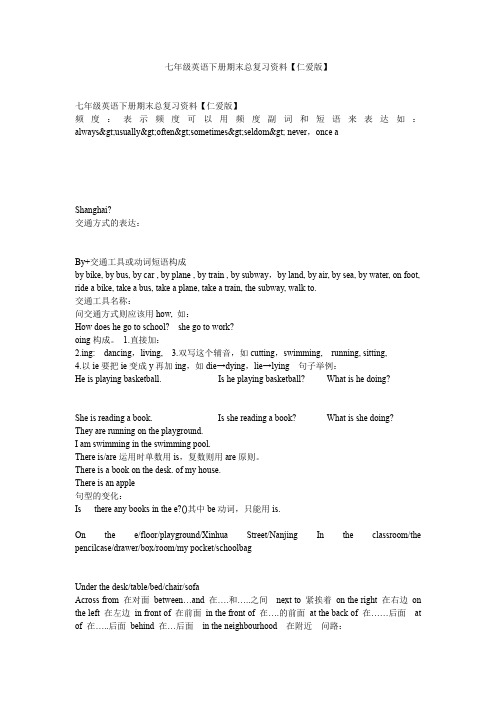
七年级英语下册期末总复习资料【仁爱版】七年级英语下册期末总复习资料【仁爱版】频度:表示频度可以用频度副词和短语来表达如:always>usually>often>sometimes>seldom> never,once aShanghai?交通方式的表达:By+交通工具或动词短语构成by bike, by bus, by car , by plane , by train , by subway,by land, by air, by sea, by water, on foot, ride a bike, take a bus, take a plane, take a train, the subway, walk to.交通工具名称:问交通方式则应该用how, 如:How does he go to school? she go to work?oing构成。
1.直接加:2.ing: dancing,living,3.双写这个辅音,如cutting,swimming, running, sitting,4.以ie要把ie变成y再加ing,如die→dying,lie→lying 句子举例:He is playing basketball. Is he playing basketball? What is he doing?She is reading a book. Is she reading a book? What is she doing?They are running on the playground.I am swimming in the swimming pool.There is/are运用时单数用is,复数则用are原则。
There is a book on the desk. of my house.There is an apple句型的变化:Is there any books in the e?()其中be动词,只能用is.On the e/floor/playground/Xinhua Street/Nanjing In the classroom/the pencilcase/drawer/box/room/my pocket/schoolbagUnder the desk/table/bed/chair/sofaAcross from 在对面between…and 在….和…..之间next to 紧挨着on the right 在右边on the left 在左边in front of 在前面in the front of 在….的前面at the back of 在……后面at of 在…..后面behind 在…后面in the neighbourhood 在附近问路:Is there a post office near here?Where is the post office ,please ?How can I get to post office?指路:It’s over there .to the end.时间表达:几点:介词at+点钟(几点的表达有两种,顺读和逆读,逆读有两种情况,一用past,小于或等于30分时,二用to,大于30分时,此时整点部分应该加1)如:at six at twelve at ten past eight at a quarter past eighthalf past eight fifteen to eleven 注:顺读:10:40 ten forty哪天:用介词on+星期或日期(日期的表达,英式是:the+序数词的日+of+月份,美式是:月份+the+序数词的日)如:on Monday on Friday on April the tenth on the ninth of April序数词:first第一second第二third第三fifth eighth第八ninth第九twelfth第十二twentieth第二十twenty-first第二十一twenty-second 第二十二twenty-third哪年、哪月、哪个季节:介词用in 读)In 1996——in nineteen ninety-six谈论能力:使用情态动词can do sth. Sb can’t do sthCan sb do sth?动词过去式变1. watched looked2. lived loved liked danced3.y为i ,ed worried carried5. A—A A—B 型was are——were have/has——had go——went did+动词的过去式+其它。
仁爱版英语七年级下册知识点复习归纳(完整版)

仁爱版英语七年级下册知识点复习归纳(完整版)Ren'ai English Grade 7 Unit 5 Topic 1 ReviewKey Grammar: Present Simple Tense (often used with adverbs of frequency such as never。
seldom。
sometimes。
often。
usually。
always)Key XXX:How do you usually come to school?I usually come to school by subway.How often do you go to the library?XXX/Three times a week/Very often/Every day/SeldomXXX:1.I always come to school by bus。
"By" is used with the name of a n method。
without any articles in een。
If there is an article such as "a," "the," or "my" in front of the n method。
"in" or "on" should be used instead。
For example。
"on the train" is the same as "by train," "on his bike" is the same as "by bike," and "inmy car" is the same as "by car." To distinguish een "on foot" and "walk," "on foot" means "walking" XXX but only as an adverb of manner at the end of a sentence。
仁爱版七年级下册英语复习知识点
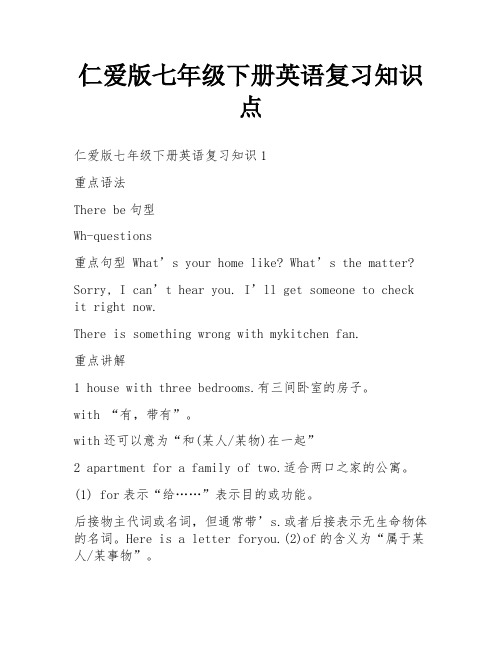
仁爱版七年级下册英语复习知识点仁爱版七年级下册英语复习知识1重点语法There be句型Wh-questions重点句型What’s your home like? What’s the matter?Sorry, I can’t hear you. I’ll get someone to check it right now.There is something wrong with mykitchen fan.重点讲解1 house with three bedrooms.有三间卧室的房子。
with “有,带有”。
with还可以意为“和(某人/某物)在一起”2 apartment for a family of two.适合两口之家的公寓。
(1) for表示“给……”表示目的或功能。
后接物主代词或名词,但通常带’s.或者后接表示无生命物体的名词。
Here is a letter foryou.(2)of的含义为“属于某人/某事物”。
She is a friend of Lily’s. = She is Lily’s friend.3 What’s the matter?怎么了?该句常用来询问某或某物出了什么什么问题或毛病;询问具体某人或某物出了什么问题时,还可以表达为:What’s the matter with sb./sth.某人或某物出了什么毛病。
What’s the matter? = What’swrong?4 Ihear you playing the piano.我听见你在弹钢琴。
hear…doing sth.“听见……在做某事”,强调正在进行的动作。
hear…dosth.“听见……做了某事”,强调全过程。
hearabout sth.听到关于某事物的消息 hear from sb.接到某人的来信、电话等hear of sb./sth.听到或知道某人或某事物的情况5 a lot of = lots of许多后接可数名词,相当于many;后接不可数名词,相当于much,用于肯定句中;但是注意:如果是否定句,则常用many或much.6 be far from… 离……远(抽象距离)be…away from…离……远(具体距离)My school is not far from thebookstore. The sea is 2 miles away fromthe hotel.7 There is something wrong with sb./sth.某人或某物出问题/有毛病了。
仁爱版英语七年级下最全全部全部知识点总结
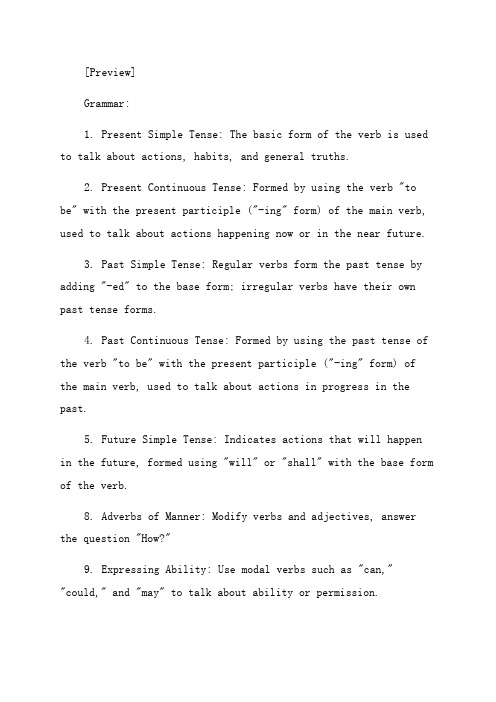
[Preview]Grammar:1. Present Simple Tense: The basic form of the verb is used to talk about actions, habits, and general truths.2. Present Continuous Tense: Formed by using the verb "to be" with the present participle ("-ing" form) of the main verb, used to talk about actions happening now or in the near future.3. Past Simple Tense: Regular verbs form the past tense by adding "-ed" to the base form; irregular verbs have their own past tense forms.4. Past Continuous Tense: Formed by using the past tense of the verb "to be" with the present participle ("-ing" form) of the main verb, used to talk about actions in progress in the past.5. Future Simple Tense: Indicates actions that will happen in the future, formed using "will" or "shall" with the base form of the verb.8. Adverbs of Manner: Modify verbs and adjectives, answer the question "How?"9. Expressing Ability: Use modal verbs such as "can," "could," and "may" to talk about ability or permission.10. Articles: "A," "an," and "the" are used to indicate whether a noun is specific or nonspecific.11. Prepositions: Words that show the relationship between a noun/pronoun and other words in a sentence.Vocabulary:2. Verbs and Adjectives: Actions, feelings, descriptions, etc.4. Hobbies and Sports: Vocabulary related to leisure activities and sports.5. Jobs and Professions: Vocabulary related to different occupations.6. Places: Vocabulary related to different locations and buildings.8. Environment: Vocabulary related to nature, pollution, and conservation.Reading:2. Skimming and Scanning: Techniques for quickly locating information in a text.3. Inferred Meaning: Inferring information from context clues.4. Making Inferences: Drawing conclusions based on information provided.5. Critical Thinking: Analyzing and evaluating text to form opinions and make judgments.Listening:2. Listening for Specific Information: Identifying key details or specific information in spoken English.3. Understanding Dialogue: Listening to conversations and understanding the roles and intentions of the speakers.4. Listening for Inferred Meaning: Inferring informationthat is not explicitly stated from the context.Speaking:1. Dialogue Practice: Engaging in conversations with classmates or teachers to practice spoken English.3. Pronunciation: Practicing correct pronunciation of words and sounds.4. Fluency: Developing the ability to speak English smoothly and confidently.Writing:1. Sentence Structure: Writing sentences with proper grammar and word order.2. Paragraph Writing: Organizing ideas and writing coherent paragraphs.3. Descriptive Writing: Using adjectives and sensorylanguage to describe people, places, and things.4. Narrative Writing: Writing stories with a clear beginning, middle, and end.5. Letter Writing: Understanding the format and structure of formal and informal letters.7. Editing and Proofreading: Correcting errors in spelling, grammar, punctuation, and sentence structure.。
仁爱版英语七年级下册知识点复习归纳

千里之行,始于足下。
仁爱版英语七年级下册知识点复习归纳
仁爱版英语七年级下册的知识点复习归纳如下:
Unit 1-5: 发音、单词、词组、语法(一般现在时、一般过去时、现在进行时、一般将来时)、日常用语、听力训练
Unit 6: 日常用语、单词、词组、语法(一般现在时、一般过去时、现在进行时)、听力训练
Unit 7-8: 日常用语、单词、词组、语法(一般现在时、一般过去时、现在进行时、一般将来时)、听力训练
Unit 9: 日常用语、单词、词组、语法(一般现在时、一般过去时、现在进行时、一般将来时、情态动词)、听力训练
Unit 10-11: 日常用语、单词、词组、语法(一般现在时、一般过去时、现在进行时、情态动词、动词不定式)、听力训练
Unit 12: 日常用语、单词、词组、语法(一般现在时、一般过去时、现在进行时、情态动词、被动语态)、听力训练
Unit 13-14: 日常用语、单词、词组、语法(一般现在时、一般过去时、现在进行时、完成时、情态动词、宾语从句)、听力训练
Unit 15: 日常用语、单词、词组、语法(一般现在时、一般过去时、现在进行时、完成时、情态动词、宾语从句、名词性从句)、听力训练
第1页/共2页
锲而不舍,金石可镂。
以上是仁爱版英语七年级下册的知识点复习归纳,主要包括发音、单词、词组、语法、日常用语和听力训练。
复习这些知识点能够帮助学生巩固和提高英语水平。
仁爱版英语七年级下册知识点复习归纳
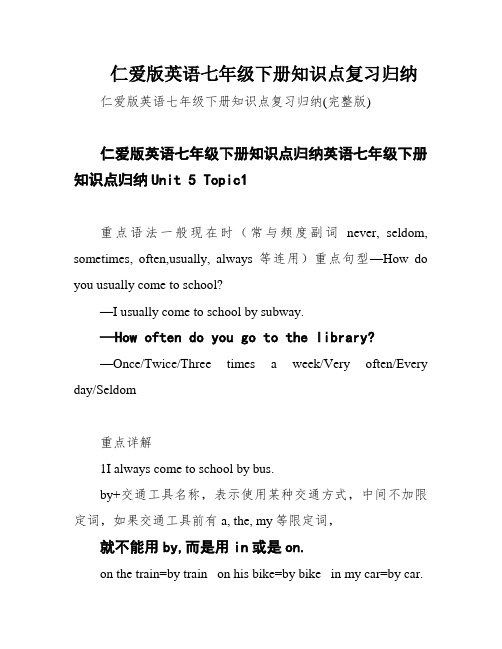
仁爱版英语七年级下册知识点复习归纳仁爱版英语七年级下册知识点复习归纳(完整版)仁爱版英语七年级下册知识点归纳英语七年级下册知识点归纳Unit 5 Topic1重点语法一般现在时(常与频度副词never, seldom, sometimes, often,usually, always等连用)重点句型—How do you usually come to school?—I usually come to school by subway.—How often do you go to the library?—Once/Twice/Three times a week/Very often/Every day/Seldom重点详解1I always come to school by bus.by+交通工具名称,表示使用某种交通方式,中间不加限定词,如果交通工具前有a, the, my等限定词,就不能用by,而是用in或是on.on the train=by train on his bike=by bike in my car=by car.巧辩异同on foot与w alk on foot“走路”,是介词短语,不能作谓语,只作方式状语,位于句末。
walk“走路”,是动词,可以作谓语。
goto…onfoot= walk toI often go to school on foot. =I often walk to school.仁爱版英语七年级下册知识点复习归纳(完整版)同样,go to….bybike = ride a bike togoto….by car = drive a car togo to…by plane = fly togoto…b y bus = take a bus to2 Come on!It’stime for class. come on“快点,加油,来吧”。
It’stime for sth.“该做某事了”,与It’stime to do sth.意思一样。
仁爱英语七年级下册总复习资料
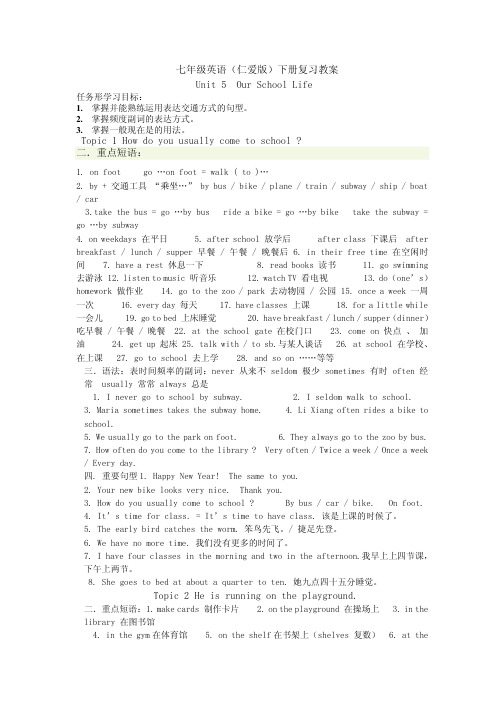
�语短点重�二 ? loohcs ot emoc yllausu uoy od woH 1 cipoT
。法用的是在现般一握掌 .3 。式方达表的词副度频握掌 .2 。型句的式方通交达表用运练熟能并握掌 .1 �标目习学形务任
efiL loohcS ruO 5 tinU 案教习复册下�版爱仁�语英级年七
法用的型句 eb erehT �识知法语、三 hts od ot tnaw/hts od ot bs tnaw .41 hts bs lleT hts od ot bs lleT hts tuoba bs lleT .31 hts od/hts gniod bs raeh 用常。果结的听重侧�见听�到听 raeh�)物(人某说听 fo reh�信是不人是语宾 morf raeh 意注 bs morf raeh =bs morf rettel a teG .21 里墙在 llaw eht ni 上墙在 llaw eht nO .11 �空悬�上河在 revir eht revo 上面水在浮 revir eht nO .01 )西东的身本树(eert eht nO 上树在�西东的身本树非�eert eht nI .9 管看�顾照 fo erac ekat = retfa kooL .8 好拾收们他把 yawa meht tuP .7 论谈人某和.bs htiw klat 论谈 tuoba klaT .6 面前�的面外�子屋 在 esuoh eht fo tnorf nI 面前�的面里�子屋在 esuoh eht fo tnorf eht nI .5 别区的 nrael 与 习学�词动 房书�词名 yduts 。yduts ecin a evah uoY .4 后以会一 retal tnemom A .3 楼下 sriatsnwod oG 楼上 sriatspu oG .2 式方的议建提他其习复 uoy t’nod yhW= ton yhW .1 楼一示表 roolf dnuorg eht 用语英式英。 ”层的房楼“指处此�板地 roolf 楼一语英式美 roolf tsrif eht nO 组词点重、二 fo tnorf ni ,ot txen ,raen ,rednu ,dniheb ,no ,ni 词介位方握掌练熟、4 筑建等校学、庭家、间房写描语英用练熟能、3 法用及式形种各的 eb ereht 握掌、2 组词点重和词单握掌、1
仁爱英语初一下册复习资料

仁爱英语初一下册复习资料仁爱英语初一下册复习资料七年级下册复习导纲Unit 8 The Seasns and the eatherTpi1 hat’s the eather lie tda?一.重点词语:1 季节词汇:四季名词springsuerAutun / fallinter四季特征arhtlld四季色彩greenbrightellhite四季活动hiesilib untainsae snen2 天气词汇:天气名词rainindludsnsunfg对应形容词rainindludsnsunnFgg3 in spring / suer / fall / inter在春天;夏天;秋天;冬天4 g libing untains / shpping / siingquite = ver 很,相当6 e ba t life 复苏,复活7 名词转化为形容词:hpe – hpeful are – areful8 fr Deeber t Februar 从十二月到二月9 fall ff 落下;掉落10 eather reprt 天气预报11 a hpeful seasn 一个充满希望的季节the harvest seasn丰收的季节12 e after 紧跟其后13 get arer and arer 变得越越暖和14 ae dinner 做饭ae tea 泡茶ae faes 做鬼脸ae friends 交朋友ae ishes 许愿ae a istae 犯错误ae a nise 制造噪音ae a sentene 造句ae sure 确信ae duplings 包饺子二、重点句型:1 hat’s the eather lie tda? = H is the eather tda? 今天天气怎么样?It ls lie rain = It ls lie raining 看起好像要下雨。
2 hih seasn is the arest / httest / lest / ldest in the ear?一年里哪个季节最暖和;最热;最凉快;最冷?3 Seties it rains quite heavil / hard 有时候雨下得很大。
仁爱版英语七年级下册知识点归纳完整版

仁爱版英语七年级下册知识点归纳英语七年级下册知识点归纳Unit 5 Topicl重点语法一般现在时(常与频度副词never, seldom, sometimes, often ‘usually,always等连用)重点句型一How do you usually come to school—I usually come to school by subway.—How often do you go to the library—On ce/Twice/Three times a week/Very ofte n/Every day/Seldom重点详解1 I always come to school by bus.by+交通工具名称,表示使用某种交通方式,中间不加限定词,如果交通工具前有a, the, my等限定词,就不能用by,而是用in或是on.on the train=by train on his bike=by bike in my car=by car.巧辩异同on foot 与walkon foot“走路”,是介词短语,不能作谓语,只作方式状语,位于句末。
walk "走路”,是动词,可以作谓语。
go to •••on foot= walk toofte n go to school on foot. =I ofte n walk to school.同样,go to ….by bike =ride a bike togo to …. by cardrive a car to5 we want to know about the school life of American students. 我们想了解一下美国学生的学校生活。
know about“了解,知道关于…”。
6 巧辩异同a few 与fewa few“一些”,few “很少,几乎没有",修饰可数名词。
英语仁爱版七年级下学期总复习ppt课件

认识到了贫困户贫困的根本原因,才 能开始 对症下 药,然 后药到 病除。 近年来 国家对 扶贫工 作高度 重视, 已经展 开了“ 精准扶 贫”项 目
英语(仁爱版) 七年级(下)学期总复习
8、现在进行时中动词现在分词的构成及发音规则: 一般在动词末尾加ing. 以不发音字母e结尾的动词,先去e再加ing. 以重读闭音节结尾的动词,如果结尾只有一个辅音字母,应先双写该字母
7、一般现在时的用法 1)表现在的状态。如:I am in class 3,grade 1.我在一年级三班。 2)表经常性、习惯性的动作或存在的状态,长与表示频率的副词连用。如:
I usually go to school on foot.(=I usually walk to school.) 3)表主语具备的性格和能力等。如:She likes baseball games.她喜欢棒
get up at six. 主语(He/She/It)+doesn't+V.原形+其它。如:He/She/It doesn't get up
at six. 5、一般疑问句及其回答: Do+I/You/We/They+V.原形+其它? --Yes,I/We/They do.No,I/We/They don't. Does+he/she/it+v.原形+其它? --Yes,he/she/it does.No,he/she/it doesn't.
仁爱版英语七年级下册知识点复习归纳(完整版)

仁爱版英语七年级下册知识点归纳英语七年级下册知识点归纳Unit 5 Topic1重点语法一般现在时(常与频度副词never, seldom, sometimes, often ,usually, always等连用)重点句型—How do you usually come to school?—I usually come to school by subway.—How often do you go to the library?—Once/Twice/Three times a week/Very often/Every day/Seldom重点详解1I always come to school by bus.by+交通工具名称,表示使用某种交通方式,中间不加限定词,如果交通工具前有a, the, my 等限定词,就不能用by,而是用in或是on.on the train=by train on his bike=by bike in my car=by car.巧辩异同on foot 与walk on foot “走路”,是介词短语,不能作谓语,只作方式状语,位于句末。
walk “走路”,是动词,可以作谓语。
go to…on foot= walk toI often go to school on foot. =I often walk to school.同样,go to….by bike = ride a bike togo to…. by car = drive a car togo to … by plane = fly togo to… by bus = take a bus to2 Come on! It’s time for class. come on “快点,加油,来吧”。
It’s time for sth. “该做某事了”,与 It’s time to do sth.意思一样。
仁爱版七年级英语下册总复习重点短语和句型

仁爱版七年级下英语总复习材料Unit 5 Our School LifeTopic 1 how do you usually go to school ?1.at the school gate 在学校大门口2.Happy New Year! 新年快乐3.The same to you! 也同样祝你--- ---4.looks very nice! 看起来漂亮e to school 来上学e by bike= ride(s) a bike 骑自行车7.go by subway=take(s) the subway= in asubway乘地铁8.go by bus=take (s) a bus / in a bus / on abus 乘公共汽车9.by plane / by air /in a plane / on a plane乘飞机10.by car /in a car / take a car 坐小汽车11.by train / in a train / on a train / take atrain乘火车12.by ship/by boat / on a ship/boat / take theship 坐船13.go on foot=walk to 步行14.walk to school 走路上学15.watch TV 看电视16.do one`s homework 做家庭作业17.see a movie 看电影18.Good evening 晚上好19.want to do sth 想要做某事20.what time 什么时间21.get up起床22.on weekdays 周末23.at about six o’clock 在大约六点钟e on 快点25.It`s time for class 该上课了26.It`s time to have class 该上课了27.know about 了解--- --- 的情况28.school life 学校生活29.American students 美国学生30.take a yellow school bus 乘一辆黄色的校车31.have/has lunch 吃午餐32.at school 在学校,在上学33.eat out外出吃饭,上馆子34.on school days 在校期间35.have a short rest休息一会儿36.after lunch午餐后37.after supper/after dinner 晚饭后38.after class下课后39.after school放学后40.listen to music 听音乐41.read books看书42.go to the park 去公园43.go to the zoo去动物园44.go to the library去图书馆45.go to school去上学46.go to work去上班47.school is over 放学了48.class is over 下课了49.in one`s free/spare time50.在某人的业余时间里51.play basketball 打篮球52.play soccer 踢足球53.go swimming 去游泳54.go shopping 去买东西55.go fishing 去钓鱼56.go skating 去滑旱冰57.go skiing 去滑冰58.go climbing mountains 去爬山59.go hiking 去远足60.how often多久一次61.ball games 球赛62.have ball games 举行球赛63.four times a year 每年四次64.meet friends 见朋友65.once a week 每周一次66.twice a week 每周两次67.three times a week 每周三次68.Work must come first! 工作〔学习〕必须放在第一69.twenty past six 六点过二十分70.at twenty past six 在六点二十分71.have / has breakfast 吃早餐72.have / has lunch 吃午餐73.have / has supper 吃晚餐74.have / has dinner 吃晚餐75.half past seven 七点半76. a quarter past five 五点过十五分77.get home 到家78.go / goes to bed 上床睡觉79. a quarter to ten 十点过十五分80.drive a car 开小汽车81.the Great Wall 长城Topic 2 He is playing soccer on theplaygroundputer room 电脑室2.dining hall 食堂3.teachers` office 教师办公室4.classroom building 教学楼5.swimming pool 游泳池6.in the library 在图书馆7.in the dormitory 在宿舍里8.in the dining hall 在食堂里9.on the playground 在操场上10.at the moment = now此刻,现在11.clean the dormitory打扫宿舍12.clean the bedroom 打扫卧室13.clean the classroom 打扫教室14.clean the blackboard擦黑板15.make cards 制作卡片16.Would you like to --- --- ?17.你想做--- --- 吗?18.Good idea!好主意19.See you soon 一会儿见20.play computer games 玩电脑游戏21.May I borrow --- --- 我可以借--- ---吗?22. a few几个,一些23.Ren’ai Project English workbooks 仁爱英语练习册24.of course = sure = certainly 当然25.on time 准时26.in time 及时27.many students 许多学生28.do well in= be good at sth / doing sth在--- ---做得好29.do better in 在--- --- 做得更好30.31.on the shelf 在书架上32.return = give back 归还33.It’s a pleasure 不用谢34.Thank you all the same 还是要谢谢你35.lost and found 失物招领处36.looking for 寻找37.some money 一些钱38. a picture of my family 一张全家福照片39.thank you all the same 还是要谢谢你40.school student card 学生卡41. a pair of pants 一条裤子42. a pair of shoes 一双鞋43.two pairs of shoes 两双鞋44.singing in the room 在房间里唱歌45.dancing in the gym 在体育馆跳舞46.swimming in the gym 在体育馆游泳47.show sb around 带领某人参观48.in the center of= in the middle of 在------ 的中间,在--- --- 的中央49.on the left 在左边50.on the right 在右边51.next to 在--- --- 隔壁,在--- ---旁边,紧挨看,靠近52.at the back of 在--- ---后部,在--- --- 后53.near the playground 在操场的附近54.in the gym 在体育馆里,在健身房里55.in the swimming pool在游泳池里56.talk about their families 谈论他们家庭57.Attention, please ! 请注意!58.between --- and --在--- --- 和--- --- 之间59.stamp collection show 集邮展60.school hall 学校大厅61.every Saturday 每个星期六62.he is running 他在跑步63.in picture 1 在第一张照片里64.in picture 2 在第二张照片里65.look(looks) happy 看起来高兴66.love swimming 喜欢游泳67.talk to a Japanese girl和一个日本女孩交谈68.play the guitar 弹吉它69.in the classroom 在教室里70.in the office 在办公室里71.in the dormitory 在宿舍里72.on the playground 在操场上Topic 3 our school is very interesting1.What day 用来提问“星期几”2.have a music class 上一节音乐课3.at ten o`clock 十点钟4. a quarter to eleven 十点四十五分5.have a biology lesson上一节生物课6.have a geography 上一节地理课7.have a P.E. lesson 上一节体育课8.have an art lesson 上一节美术课9.outdoor activities 户外活动10.how many lessons 多少节课11.every week 每周12.singing and dancing唱歌跳舞13.drawing pictures 画画14.Working on math problems 做数学题15.speaking English 说英语16.learning about the past 了解过去17.an English book 一本英语书18.What do you think of it = How do youlike it ? 你觉得它怎么样?19.Difficult and boring 难学而且乏味20.Which subject 哪一门课21.Easy and interesting 容易又有趣22.Favorite subject 最喜欢的科目23.My school life 我的学校生活24.At school 在学校里,在上学25.Be friendly to sb = be kind to sb 对某人友好26.In the morning 在上午,在早晨27.In the afternoon 在下午28.I aften speak English with my classmates我经常和我的同学说英语29.After school 放学后30.Play basketball with my classmates和同学们打篮球31.On the playground 在操场上32.Every Tuesday 每周二33.Every Thursday 每周四34.school newpaper 校报35.School Time 校园时代36.And so on 等等37.Science Today 当代科学38.Thank sb for doing sth 感谢某人做了某事39.best wishes 致以美好的祝愿40.read stories 看故事书41.have a biology class 上生物课42.have breakfast 吃早饭43.run on the playground 在操场上跑步44.have a physics class上物理课45.watch animals 欣赏动物46.play soccer at school 在学校踢足球47.read a book at home 在家看书48.have dinner in the school dinning hall在学校食堂吃晚饭49.have dinner at home 在家吃晚饭Unit 6 Our Local AreaTopic 1 Is there a sofa in your study?1.On the second floor 在二楼2.Why not =Why don`t you为什么不--- --- ?3.Go upstairs 上楼4.Go downstairs 下楼5.Have a look 看一看6. A moment later 过了一会儿e in ,please 请进8.So many books 这么多的书9.On the shelf 在书架上10.You have a nice study你的书真漂亮!11.Dining room 餐厅12.Living room 客厅13.On the first floor 在一楼14.Cousins 表姐妹,表兄弟15.In the front of the house 在房子前面16.In the kitchen 在厨房17.In the study 在书房18.In the dinning room 在餐厅19.In the bedroom 在卧室20.In the garden 在花园21.Behind the door 在门后面22.Play with his pet dog和他的宠物狗玩耍23.Play games 玩游戏24.Clean the car 清洗小汽车25.Read books 看书26.Have dinner 吃饭27.Talk about 谈论28.Near my desk 在我桌子旁29.On your desk 在你桌子上30.So on 等等31.My family photo 我的全家福照片32.On the wall 在墙上33.Put them away 请把它们收起来放好34.Put it away,please把它/它们收起来放好35.Look after = take care of 照看,照顾36.In front the house 房子前面37.In the bottle 瓶子里38.Near the window 窗户边39.In the glass 杯子里40.Model planes 飞机模型41.Under the bed 床下42.How many pairs 多少双43.In the tree 树上44.On the tree 树上45.On the shelf 书架上46.On the river 河里47. A small garden 一个小花园48.Many beautiful flowers 许多美丽的花49.In the garden 花园里50. A big tree 一棵大树51.Under the tree 在树下52.Very beautiful 非常漂亮53. A large living room 一个在客厅54. A dining room 一个餐厅55. A kitchen 一个厨房56. A bathroom 一个卫生间57.I like watching TV in the living room我喜欢在客厅里看电视58.I love playing on the computer in thestudy我喜欢在书房里玩电脑59.In the drawer 在抽屉里60.On the chair 在椅子上61.Under the chair 在椅子下62.In picture A 图A里63.In picture B 图B里64.On the walls 在墙上65.In 在--- --- 里面66.On 在--- --- 上面67.Behind 在--- --- 下面68.Near 在--- --- 附近69.Next to 在--- --- 旁边70.In the front of 在--- --- 前面71.Don`t put it / them here 别把它/它们放在这儿72.Write a letter 写一封信73.Describe different rooms in your home描述你家不同的房间74.The things around your home 房子周围的事物75.I`m very glad to 我很高兴76.Get a letter from sb= hear from sb 收到某人的来信77.Tell sb about sth 告诉某人关于某事78.Tell sb to do sth 告诉某人做某事79.Tell sb sth 告诉某人某事Topic 2 What`s your home like?1.What`s your home like? 你家是什么样的?2.An apartment building 一座公寓3. A town house 城镇住宅4.Live with sb 和某从居住在一起5.Your grandparents 你的爷爷和奶奶6. A big farmhouse 农舍7.In the country 在农村8.Look for 寻找9.Let`s help him 我们去帮助他吧10.In our group 在我们小组11.For rent 出租12.Wanted 求租13.Small apartment for students小型学生公寓14.¥850 a month 每月850元15.Call Ms. Zhang 联系张女士16.House with three bedrooms 一套三居室的房子17.House with furniture for a family of three适合三口之家,家具齐全的房子18.Looking for a quiet double room 求租一间安静的双人间under ¥300 per month 月租低于300元19.Apartment for a family of two 适合两口之家的公寓20.House with four bedrooms 四居室21.Quiet double room 安静的双人间22.Excuse me 打搅了,打搅一下,劳驾,23.Your new neighbor 你的新邻居24.I`m looking for a store我在找一家商店25.On the street corner 在街道拐角处26.Post office 邮局27.Bookstore 书店28.Museum 博物馆29.Parking lot 停车场30.Supermarket 超市31.Hospital 医院32.Bank 银行33.Train station 火车站34.Park cars 停车35.Keep money 存钱36.Take trains 乘火车37.See a doctor 看医生38.Buy food 买食物39.Mail letters 邮寄信40.Buy books 买书41.Keep and show things保存和陈列物品42.Bookstored 书店43.Restaurant ['restərənt] 饭店44.I`m afaid it`s too loud 恐怕声音有点儿大45.I`m really sorry about that 十分抱歉46.At the end of 、Road 在、、、路的尽头47.On the right 在右边48. A tall tree 一棵大树49.Lot of = lots of 许多50.Tall buildings 高楼51.Small gardens 小花园52.Close to 离--- --- 近,紧挨着的53.Far from 离--- --- 远54.Not far from 离--- --- 不远55.Call it for help 打向它求助56.How is the community? 社区是什么样的?57.Living near your home 住在你家附近58.Do you like living there?59.This is linda speaking. 我是琳达60.61.What`s the matter? 有什么事吗?62.There is something wrong with =Something is wrong with某人/某物出问题,有毛病了63.Right now 立刻,马上64.From--- to--- 从--- --- 到--- ---65.The traffic is heavy 交通拥挤66.The cost of living is high生活费用高67.Houses with big yards带大院子的房子68. A house with a garden 有花园的房子Topic 3 How can I get to the bookstore?1.Go up this street to the end 沿着这条街一直走到尽头2.On your left 在你左边3.How can I get to--?我怎样才能去--- --- ?4.Go along Xinhuan Street 沿着新华路走5.Turn left at the first street 在第一条街口向左转6.Go across the bridge 穿过桥7.It`s about one hundre meters along on theright 顺着右边走大约100米〔就到〕8.Which is the way to--- ? 哪一条是到--- --- 路?9.The post office 邮局10.I`m new here 我对这儿不熟11.On 在--- --- 上面12.On the corner of 在--- --- 拐角处13.Across from 在--- --- 正对面14.Between --- and --在--- --- 和--- ---之间15.Near the bridge 在桥的附近16.Turn left and walk on 向左拐并一直往前走17.You can`t miss it 你不会错过的18.Beitai Road 北台路19.Be --- away from 离--- --- 远20.Need to do sth 需要做某事21.Take bus No.718 乘坐718路车22.Change to the No.108 bus at AnzhenBridge 在安贞桥换乘108路车23.The way to Shuanxiu Garden 去双秀花园的路24.At Liuli Bridge 六里桥25.How far “多远”,问距离。
- 1、下载文档前请自行甄别文档内容的完整性,平台不提供额外的编辑、内容补充、找答案等附加服务。
- 2、"仅部分预览"的文档,不可在线预览部分如存在完整性等问题,可反馈申请退款(可完整预览的文档不适用该条件!)。
- 3、如文档侵犯您的权益,请联系客服反馈,我们会尽快为您处理(人工客服工作时间:9:00-18:30)。
Unit 5 Our School LifeTopic 1 I usually come to school bu subway。
重点短语1. on foot go …on foot = walk ( to )…2.by plane/ship/bus/subway3. on weekdays 在平日5. after school 放学后6. in their free time 在空闲时间7. have a rest 休息一下 8. do(one’s) homework 做作业9. once a week 一周一次10. have classes 上课11. at the school gate 在校门口 12. come on 快点、加油13. Talkwith to sb.与某人谈话 14.for a short time 一会儿15.know about 了解语法:表时间频率的副词:never 从来不 seldom 极少 sometimes 有时 often 经常usually 常常 always 总是四. 重要句型1. Happy New Year! The same to you.2. Your new bike looks very nice. Thank you.3. How do you usually come to school ? By bus / car / bike. On foot.4. It’s time for class. = It’s time to have class. 该是上课的时候了。
5. The early bird catches the worm. 笨鸟先飞。
/ 捷足先登。
6. We have no more time. 我们没有更多的时间了。
7. She goes to bed at about a quarter to ten.她九点四十五分睡觉。
8.How often do you come to the library? Three times a week./Very often./Every day.9.What time do you usually get up on weekdays? I always get up at about six o’clock.Topic 2 A few students are running on the playground.重点短语:1.make cards 制作卡片2. on the playground 在操场上3. in the library 在图书馆4. in the gym在体育馆5. on the shelf在书架上(shelves 复数)6.at the Lost and Found 在失物招领处7.do some cleaning 打扫 8.swimming poor 游泳池9. some of his photos= some photos of his 他的一些照片10. on time 准时/in time及时 11.Look for 寻找12.put on 穿、戴上13.show sb. around…令某人参观……14.a few 一些 15.at the back of 在……后面16.borrow sth from…从……借回某物……四. 重要句型1.Excuse me, may I borrow some English workbooks? Of course. = Sure.2. How Long can I keep them ? Two weeks.3.You must return them on time. ( return 归还,return sth to …把……归还给……) Sure,I will.thank you.4.Sorry, we don’t have any. Thank you all the same.5.Are you doing your homework? Yes,I am./No, I’m not.6.what are you doing? I’m looking for my wallet.7.第三人称单数一样问法,只不过be动词变一下,详见课本P15页。
Topic 3 My school life is very interesting.重点短语:1.outdoor activities户外活动2. easy and interesting 容易又有趣3.difficult and boring 又难又乏味4.be kind to sb. 对某人友好5.between…and…在……之间…6.learn…from…从…中学……7. from…to…从……到…… 8.tell sb. about sth告诉某人关于某事9.think of 认为 10.a little 有点儿11.class meeting 班会 12.draw pictures 画画课本20页也要看。
重要句型1.What day is it today? Wednesday.2.What class are they having ? They are having a music class.3.What time does the next class begin ? At ten o’clock.4.What do you think of it? / How do you like it? It’s difficult and boring.5.Why do you like English ? Becauseit’s easy and interesting.6.What subject (学科)do you like best ? I like history best.7.How many English lessons does he have every week? Five.8.Can you tell me something about it ?9.my teachers and classmates are very kind to me.10.My school life is very interesting.Unit 6 Our Local AreaTopic1 Is there a computer in your study?重点词组1.Go upstairs上楼2.You have a nice study。
study名词:书房动词:学习与learn的区别3.In the front of the house 在屋子(里面的)前面In front of the house在屋子(外面的)前面4.talk about谈论 talk with sb.和某人谈论5.put……away 把……收拾好6.look after 照顾,看管 and so on 等等7.in the tree(非树本身的东西)在树上 On the tree(树本身的东西)8.On the river浮在水面上 over the river 在河上(悬空)9.On the wall在墙上in the wall 在墙里10.tell sb about sth tell sb to do sth tell sb sth11.want sb to do sth/want to do sth12.On the first floor 13. have a look14. next to 在……近旁 15.in the center of 在……中心16. play with 一起玩耍 e in 进入,进来17. Living room 客厅,起居室 18.so many 如此多语法知识: 1.What’s on the desk? There’re some model planes on it.2.How many model planes are there? There are three.3.Is there any water in the bottle? Yes,there is./No,there isn’t.4.How much water is there? Only a little.5.Don’t put it/them there.6.Put it/them away ,please.7.You must look after your things. 8.Where is the guitar? It’s on the wall.Topic 2 My home is in an apartment building重点短语:1.on the corner of 拐角处2.for rent 出租(rent sth to sb把某物租给某人rent sth from sb 从某人处租某物。
)3.post office 邮局4.parking lot 停车场5.at the end of6.such as 例如7.close to (be close toclose 与near 都有“靠近”的意思,但close 比near 更近)8.far from 远离 9.call sb. at +号码。
请打......电话与某人联系。
重点句型:1.What kind of home do you live in? It’s a townhouse with tow floors.2.How many floors are there in your building? There are seven.3.Do you like living there? Yes,I do.4.Michael is looking for an apartment near our school. Let’s help him.5.could you help me? Of course.6.Is there a bank near here? Are there any near here?Topic 3 Which is the way to the hospital?重点短语:1.a ticket for speeding 超速罚单2.go along/up/down 沿着走3.turn left/right向左转/向右转4.acrossfrom 在……对面5.change to变成6.no parking禁止停车7.get hurt受伤 8.obey the traffic rules 遵守交通规则9.keep on the right of the road 保持在路的右边10.at the foot of 在……的脚下 11.hold sth in one’s hand抓住某人的手12.traffic lights 交通灯 13.make a wrong turn 转向错误14.public phone 公用电话 15.on the street 在街上重点句型:①Excuse me,how can I get to the library??②Is there a bank near here?③Which is the way to the hospital?④Could you tell me the way to Dinghao Building?⑤Where is Beitai Road?⑥It’s about 15 kilometers away from here. You can’t miss it.Unit 7 The Birthday PartyTopic1 When is you birthday ?重点词组:1.Plan to do sth2.have a birthday partye sth to do sth3.buy sb sth=buy sth for sb重点句型1.When were you born? I was born in June,19702.Were you born in He bei? Yes,I was, No,I wasn’t.3.Where was she born? She was born in Wales,the UK.4.When was she born? She was born on october 22th,1996.5.What’s the date today? It’s May 8th.6.What’s the shape of your present? It’s round.7.What shape is it?/What’s the shape of...?It’s a rectangle.8.How long/wideis it? It’s ... Centimeters long/wide.9.What do we use it for? We use it to ...10.Here is a present for you.11.You’re a big fan of J.K.Rowling.12.When is your birthday? May 13th.13.How do you plan to celebrate it? My friends want to have a birthday party for me.14.What is your present for KangKang’s birthday?15.May I have a look? Sorry,I’m afraid you can’t.16.What is it like? It is like a flower.17.Was it like a flower before? No,it wasn’t.It was like a star.18.What shape was it before? It was a square.Topic2 I can dance and play the guitar.重点词组:1. at the birthday party在生日聚会上2.perform ballet跳芭蕾舞3.dance to disco 跳迪斯科4.take… to 把…带去…5.work out math problems 解出数学题6.read books 读书7.fly a klite放风筝 8.be good at / do well in doing擅长做…9.have a good time /enjoy oneself玩得开心10.at the age of 在……岁时11.with one’s help / with the help of 在某人的帮助下12.have a good time 玩得高兴 13.not…any more 再也(不),(不)再重点句型:1.What would you like to do at KangKang’s birthday party?I’d like to play the piano and sing some songs.2.Do you want to sing Chinese songs or English songs? Chinese songs.3.What else can you do? I can dance and play the guitar.4.Would you like to sing with me? Yes,I’d love to.5.I’m sure we’ll have a good time at the party. P67课文要背Topic 3 Everyone hag a good time.1.birthday party 生日聚会2.sing a song唱歌3.enjoy oneself 过得愉快4. play the piano 弹钢琴5.fall down 掉下6. hurt oneself 伤了自己7.make a wish许愿8.by hand 亲手9.at once 立刻,马上 10.blow out 吹灭重点句型1.How was KangKang’s birthday party? It was very nice.2.Did you sing a song at the party? Yes,I did.3.What about/How about Tom? He performed some magic tricks.4.Did KangKang enjoy himself?(enjoy doing sth.) Of course.He was very happy.5.What’s the matter? I missed the chair and fell down.6.Did you hurt yourself? No,I didn’t hurt myself.I’m OK.7.Where is the washroom? This way,please.8.What timedid you come home last night?9.I’m afraid it was too late. 恐怕太迟了。
